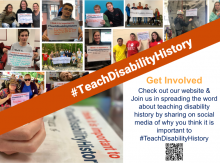Efforts to Advance Teaching of Disability History Converge
Through the years, I have attend many uplifting annual conferences of the National Council for the Social Studies. Yet the November 22-24, 2024 conference set a new high for new energy and focus on teaching disability history. Interest in workshops and posters on disability history attracted strong participation. And my walk through the vast exhibit hall encountered greater interest than ever from publishers and programs in stories and primary sources reflecting disabled advocates across history. Post-conference conversations with leaders from school districts and states continue. Yet as a spot survey at the conference reveals, we still have a long to go. (See below.) A few highlights from the conference follow.
Easterseals Massachusetts #TeachDisabilityHistory Campaign and Emerging America
The #TeachDisabilityHistory team from Easterseals Massachusetts made their history presentation at a national conference for the first time, joined by Emerging America speaking about the Reform to Equal Rights: K-12 Disability History Curriculum. Visit the campaign website, links to contact the Easterseals team, and campaign video. Participants learned about the campaign, traced the long arc of disability history in America, and played an interactive game in Kahoot. View the presentation slides.
Supreme Court Rulings on Disability
The American Bar Association (ABA) presented an interactive workshop focused on disability-related rulings of the U.S. Supreme Court. Five classroom-ready case summaries from 1975 to 1999 by ABA appear in this collection (beginning on page 32 of the summaries in this folder). The folder includes excellent slides from the ABA on Disability Rights.
The ADA and Civic Engagement
Three Kansas University teacher education students, Katie McWard, Ethan Reiter and Conner Thrash presented an in-depth lesson on civic engagement based on student investigation of the ADA and including an innovative school accessibility inventory: National Ambitions, Local Shortfalls: Teaching Civil Rights and Government through the Activism of the ADA. See also Celebrating Opportunity for People with Disabilities: 70 Years of Dole Leadership - Robert J. Dole Archive and Special Collections - Kansas University.
Cured: A Conversation on Intersectionality
Some of us from Emerging America had an intriguing conversation with Debra Fowler from UnErased about their new production: Cured: film and curriculum on the 1973 removal of homosexuality from the American Psychiatric Association's manual on mental illness.
A Resolution on Students with Disabilities and Disability History
Members of the Teaching Disability History Interest Group found several opportunities to talk and to meet, including time to work on a draft a resolution for the 2025 NCSS House of Delegates in Washington, DC. We will discuss the resolution at the December 19 meeting of the group. Contact Rich Cairn <rcairn - @ - collaborative.org> to review and/or endorse the resolution. See our web page on the 2024-2027 Keene State College project for details and to sign up for the meeting.
The Need Remains: Teacher Survey Results
Snap surveys at the 2023 and 2024 conferences of the National Council for the Social Studies confirm the trends we see from other sources. Almost half of the 97 respondents report that they never teach disability history. About half say they teach disability history 1-3 times a year. 6-12% say 4-9 times a year. Just 1% teach disability history 10+ times a year.
Our broad annual survey in 2024 had a modest 19 respondents. As in 2023, even among this self-selected group, 68% reported teaching disability history minimally, most of those saying that they merely "mention it in passing" for a minute or two. Just 11% said that they teach it 10 or more times per year. Most of the third who teach disability history develop their own curriculum. Next in frequency is use of the Emerging America's Reform to Equal Rights and the lessons of the Disability History Museum. For primary sources and other materials on disability history 71% access the Library of Congress, 29% the Emerging America, and 14% the Disability History Museum. (Review the 2022 survey report and 2023 survey report.)
In 2024, teachers reported their greatest need for resources to help them "expand or improve teaching of disability history" was "primary sources" (75%), "lesson plans on disability history (56%), and professional development options (50%). This echoes 2023 survey results.
At the 2023 NCSS conference, we asked what people teach. Of the 31 respondents: 23% teach passage of the ADA; 13% teach 19th century reformers; 13% teach the disability rights movement of the 1960s-1980s; 10% teach the Civil War and disability; 6% teach disability in the Progressive Era; 6% teach about disability and civic engagement projects; and 3% teach disability and the history of education.
The broad annual survey has found a different distribution of topics taught. The most common topics reported are "Understanding the lives and experiences of disabled people" (88%), education of learners with disabilities (65%), and four topics: definitions, biographies, advocacy and leaders for disability rights (53%). (Figure 1. Review a text version of the 2023 report.)







